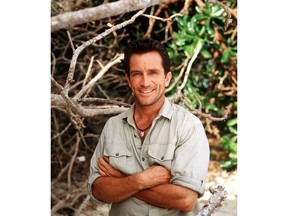
Article content
On this date, May 31, in history:
In 1578, Italian archeologist Antonio Bosio became the first man in modern times to rediscover the Christian catacombs in Rome. Researchers who followed him dubbed Bosio “the Columbus of the Catacombs.”
In 1578, Martin Frobisher set sail from England, looking for a Northwest Passage to the Orient. He instead found the Hudson Strait. It was the explorer’s third and last voyage to Canada. He was later knighted for his role in fighting the Spanish Armada. He died at sea after being mortally wounded by the Spanish in 1594.
Advertisement 2
Article content
In 1665, Jerusalem’s rabbi Sjabtai Tswi proclaimed himself the Messiah.
In 1701, Alexander Cruden, compiler of a well-known concordance to the King James Version of the Bible, was born.
In 1793, an act making it possible for public servants to perform marriages was passed in Upper Canada.
In 1819, poet Walt Whitman was born in West Hills, N.Y.
In 1859, the “Big Ben” clock at the Houses of Parliament in London began ticking.
In 1877, the city of Brantford, Ont., was incorporated.
In 1889, more than 2,200 people died when a dam break sent a roof-top-high wave of water, mud, rocks and other debris crashing into Johnstown, Penn.
In 1910, the Union of South Africa was founded.
In 1911, the British liner RMS Titanic was launched from its building berth at the Port of Belfast.
In 1916, British and German fleets fought the Battle of Jutland off Denmark during the First World War.
In 1928, Nova Scotia abolished its upper house, the legislative council.
In 1942, German warplanes bombed Canterbury, England, causing severe damage to Canterbury Cathedral, the seat of Anglicanism, in retaliation for the Allied assault on Cologne, Germany.
Advertisement 3
Article content
In 1943, Ernest Manning replaced the late William Aberhart as Alberta’s Social Credit premier. Manning remained in office until 1968.

In 1961, South Africa became an independent republic, breaking its 155-year tie with Britain.
In 1962, Nazi SS officer Adolf Eichmann was hanged in Israel for his complicity in killing millions of Jews during the Second World War.
In 1968, Canada’s first heart transplant was performed at the Montreal Heart Institute. A team headed by Dr. Pierre Grondin operated on 58-year-old Albert Murphy. The retired butcher died 46 hours later.
In 1970, 70,000 people died in Peru in what experts called the most destructive earthquake in the Western hemisphere. Its magnitude measured 7.9.
In 1972, Prime Minister Pierre Trudeau announced the introduction of Canadian bravery awards, plus a third level of the Order of Canada — Member.
In 1977, the trans-Alaska oil pipeline, three years in the making, was completed.
In 1985, devastating tornadoes tore across central Ontario, striking the communities of Barrie, Grand Valley, Orangeville and Tottenham. Twelve people died, hundreds were injured and 1,000 buildings were damaged or destroyed. Damage topped $150 million.
Article content
Advertisement 4
Article content
In 1990, the Supreme Court of Canada said judges must give native rights a generous and liberal interpretation.
In 1996, Timothy Leary died in Los Angeles at age 75. The high priest of LSD and an emblem of the 1960’s counter-culture had encouraged young people to “tune in, turn on and drop out.”
In 1997, the Confederation Bridge linking Prince Edward Island to the mainland opened to traffic. Hundreds of cars waited in line to cross the 13-kilometre span.

In 2000, thousands of fans, former teammates and opponents, and political leaders attended the state funeral for Maurice (Rocket) Richard at Montreal’s Notre-Dame Basilica. The legendary Montreal Canadiens winger had died of cancer four days earlier at age 78. Richard was the heart of the NHL franchise for 18 seasons until 1960, winning eight Stanley Cups and scoring 544 goals.
In 2000, the reality TV show Survivor first debuted on CBS. (The winner of the premiere series was Richard Hatch).
In 2001, Sheila Fraser became the first woman to serve as Auditor General of Canada.
In 2003, Nova Scotia MP Peter MacKay was elected leader of the federal Progressive Conservative Party at its convention in Toronto.
Advertisement 5
Article content
In 2003, two-and-a-half decades of supersonic travel between New York and Paris came to an end as the last commercial flight of the Air France Concorde touched down in Paris. British Airways, the only other airline that flew the Concorde, retired its fleet at the end of October 2003.
In 2004, Montreal Archbishop Andrew Hutchison was elected national leader of the Anglican Church of Canada.
In 2005, 23-year-old Natalie Glebova of Toronto, was crowned Miss Universe at the pageant in Bangkok.
In 2005, breaking a silence of 30 years, former FBI official W. Mark Felt stepped forward as “Deep Throat,” the secret Washington Post source that helped bring down U.S. President Richard Nixon during the Watergate scandal.
In 2006, a new smoking ban came into effect in Ontario and Quebec that prohibited smoking in all enclosed workplaces and public places.
In 2007, Quebecor acquired Osprey Media’s chain of newspapers in a $517-million deal.
In 2007, in his final report, Ipperwash inquiry commissioner Sidney Linden found the government of former Ontario premier Mike Harris, Ottawa and the OPP all bore responsibility for events that led to aboriginal protester Dudley George’s death. Linden called for the disputed land to be returned immediately to the Stoney Point First Nation, along with compensation, and recommended Ontario establish a permanent, independent and impartial agency to facilitate and oversee the settling of land and treaty claims. (The Ipperwash standoff began when about 30 unarmed protesters occupied the park in the summer of 1995. The protesters said it contained a burial ground destroyed when a military camp was built on the land during the Second World War).
Advertisement 6
Article content
In 2009, Millvina Dean, the last survivor from the sinking of the Titanic in 1912, died at age 97 in Southampton, England.
In 2010, Al-Qaida announced that its No. 3 official, Mustafa al-Yazid, had been killed along with members of his family. A U.S. official said al-Yazid was believed to have died in a U.S. missile strike.
In 2010, Chris Haney, who co-created Trivial Pursuit with Scott Abbott, died in a Toronto hospital after a long illness. He was 59. The game, released in 1982, took off after a slow start and went on to become a staple of pop culture in several versions. The duo sold the rights to toy giant Hasbro in 2008 for US$80 million.
In 2011, True North Sports and Entertainment announced it had purchased the Atlanta Thrashers and would move the team back to Winnipeg. The Manitoba capital had been without an NHL franchise since the Jets moved to Phoenix to become the Coyotes in 1996.

In 2011, the U.S. Supreme Court rejected an appeal from former media mogul Conrad Black after challenging his two remaining convictions on fraud and obstruction of justice. (In June, he was resentenced to spend up to another 13 months behind bars. He was released on May 4, 2012, and deported to Canada where he was earlier granted a one-year temporary resident permit.)
Advertisement 7
Article content
In 2013, an EF5 tornado struck El Reno, Okla., which along with subsequent flooding, killed 19 people, including three storm chasers. The twister had a record-breaking width of 4.2 kilometres.
In 2013, Jean Stapleton, who played Edith Bunker in the groundbreaking 1970s TV comedy All in the Family, died of natural causes. She was 90.
In 2016, the Liberal government’s controversial Bill C-14 on assisted dying sailed through the House of Commons, approved by a vote of 186-137. Days later, the Senate voted to adopt the legislation in principle but sent it back to the House of Commons to include those who aren’t terminally ill. On June 17, almost two weeks past the SCOC deadline, senators caved and accepted the legislation, which limits the right to assisted dying to those whose natural death is “reasonably foreseeable.”
In 2017, a massive suicide truck bombing during morning rush hour rocked a highly secure diplomatic area of Afghanistan’s capital, Kabul, killing over 150 people and wounding more than 400 others.
In 2018, Ottawa announced it was imposing dollar-for-dollar tariff “countermeasures” on up to $16.6 billion worth of U.S. imports in response to the American decision to make good on its threat of similar tariffs against Canadian-made steel and aluminum.
Advertisement 8
Article content
In 2018, the Archdiocese of St. Paul and Minneapolis announced a US$210 million settlement with 450 victims of clergy sexual abuse as part of its plan for bankruptcy reorganization, making this the second-largest payout in the scandal that rocked the U.S.’s Roman Catholic Church.
In 2019, police in Virginia Beach said the suspect in a deadly mass shooting at a municipal building was a disgruntled longtime employee of the city’s Public Works Department. Twelve people were killed. Five others, including a police officer, were wounded before police fatally shot the suspect.
In 2020, cities across the U.S. imposed curfews to try to stem violent protests over the death of George Floyd in Minneapolis police custody. Police and National Guard troops demonstrated force by firing tear gas and rubber bullets at crowds. New York City suffered its worst day of unrest in decades.
In 2020, the SpaceX Dragon capsule made history when it docked smoothly at the International Space Station. NASA astronaut Chris Cassidy greeted the incoming crew by ringing the ship’s bell.

—-
Article content




